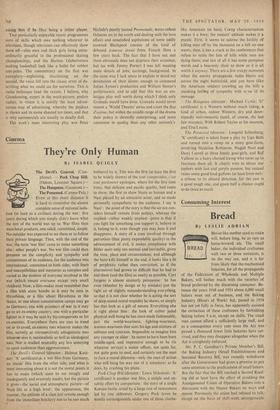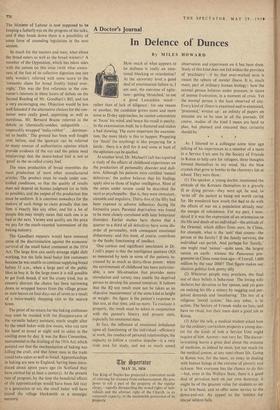Consuming Interest
Bread
By LESLIE ADRIAN
BREAD like mother used to make will, before long, be as rare as home-brewed ale. The small BREAD baker, the individual craftsman with two or three assistants, is on the way out, and it is far from likely that the mechanised bakeries, for all the propaganda of the Federation of Wholesale and Multiple Bakers, will bother much with the varieties of bread preferred by the discerning consumer. Be- tween the years 1948 and 1954 about 6,000 small bakers went out of business, and the Baking Industry (Hours of Work) Act, passed in 1954 but not yet fully in force, has apparently assisted the extinction of these craftsmen by forbidding baking before 5 a.m. except on shifts. The small man cannot afford a sufficiently large staff, and as a consequence every year since the Act was passed a thousand fewer little bakeries have sur- vived, and they may disappear altogether when the Act is completely enforced.
Mr. P. C. Goodhart's Private Member's Bill, the Baking Industry (Small Esthblishments and Seasonal Resorts) Bill, was recently withdrawn after the Government had given a promise to pay some attention to the predicament of small bakers. But the fact that the Bill reached a Second Read- ing did at least have the effect of prodding the Amalgamated Union of Operative Bakers into a discussion with the Master Bakers on ways and means. Previously the union had refused to talk, except on the basis of shift-work arrangements. The Minister of Labour is now supposed to be keeping a fatherly eye on the progress of the talks, and if they break down there is a possibility of some form of amending legislation in the next session.
So much for the Masters and men; what about the bread eaters as well as the bread winners? A member of the Opposition, which has taken sides with the unions on this issue (with what aware- ness of the fate of its collective digestion one can only wonder), referred with some scorn to the 'romantic claim for bread freshly baked over- night.' This was the first reference to the con- sumer's interests in three hours of debate on the Second Reading of Mr. Goodhart's Bill, and not a very encouraging one. Objection would be less well founded if the alternative choices for the con- sumer were really good, appetising as well as nutritious. Mr. Bernard Braine referred in the debate to 'chemically-sodden, indigestible . . . impeccably wrapped "india-rubber" ... detrimen- tal to health.' The ground has been well fought over before, and the ignorant can be referred to many sources of authoritative opinion which provide evidence (if the eye and the palate need reinforcing) that the steam-baked loaf is not as 'good' as the so-called crusty loaf.
The mass production of bread resembles the mass production of most, other manufactured 'articles. The product must be made under con- trolled conditions, so that the quality of results does not depend on human judgment (or as little as possible), and the output of the production line must be uniform. It is common nowadays for the makers of such things to claim proudly that one item is exactly like any other, and for a lot of people this may simply mean that each one is as bad as the next. Variety and quality are the price we pay for the much-vaunted 'automation' of the baking industry.
The Goodhart measure would have removed some of the discrimination against the economic survival of the small baker contained in the 1954 Act. The large firm can easily arrange night shift working, but the little local baker lost customers because he was unable to continue supplying bread before 11 a.m., when a large part of the public likes to buy it. In the large town it is still possible to get fresh bread, if not' the crusty kind, but in country districts the choice has been narrowing down to wrapped loaves from the village grocer or stale loaves on four days out of seven as a result of a twice-weekly shopping visit to the nearest town.
The point of no return for the baking craftsman may soon be reached with the disappearance of the versatile bakery assistant, much sought after by the small baker with few ovens, who can turn his hand to bread at night and to cakes in the cooling oven by day. It was, the Rees Committee, instrumental in the drafting of the 1954 Act, which pointed out that the mechanisation of baking was killing the craft, and that fewer men in the trade could bake cakes as well as bread. Apprenticeships in baking are new to England, having been intro- duced about seven years ago (in Scotland they have existed for at least a century). At the present rate of progress, by the time the beneficial effects of the apprenticeships would have been felt (say in a generation or so), the small baker will have joined the village blacksmith as a nostalgic memory.















































 Previous page
Previous page